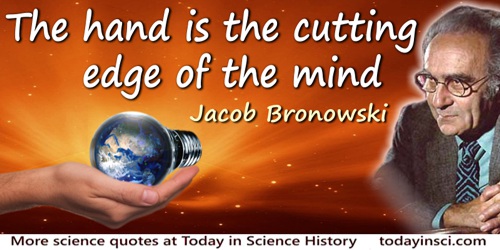Self-Taught Quotes (6 quotes)
[In 18th-century Britain] engineers for the most began as simple workmen, skilful and ambitious but usually illiterate and self-taught. They were either millwrights like Bramah, mechanics like Murdoch and George Stephenson, or smiths like Newcomen and Maudslay.
In Science in History (1969), Vol. 2, 591.
Look for knowledge not in books but in things themselves.
Non ex libris solum,sed ex rebus ipsis scientiam quaeritis.
Non ex libris solum,sed ex rebus ipsis scientiam quaeritis.
In De Magnete, Magnetisque Corporibus, et de Magno Magnete Tellure, On the Magnet,
Magnetic Bodies, and the Great Magnet Earth (1600). As translated in John Daintith, Biographical Encyclopedia of Scientists (2009), 291. A more literal translation is “Not only in books but in things themselves look for knowledge,” as translated by P. Fleury Mottelay (1893) in De Magnete (1958), xlix. Original Latin in De Magnete (1600), Praefatio, unpaginated second page of preface.
One must learn by doing the thing; though you think you know it, you have no certainty until you try.
In play, 'Trachiniae', collected in George Young (trans.), The Dramas of Sophocles: Rendered in English Verse: Dramatic and Lyric (1916), 191.
Thomas Godfrey [was] a self-taught mathematician, great in his way…. But he knew little out of his way and was not a pleasing companion, as, like most great mathematicians I have met with, he expected universal precision in everything said, and was forever denying and distinguishing upon trifles, to the disturbance of all conversation.
In The Autobiography of Benjamin Franklin (1850), 57-58.
Those who are good at archery learnt from the bow and not from Yi the Archer. Those who know how to manage boats learnt from boats and not from Wo (the legendary mighty boatman). Those who can think learnt for themselves and not from the sages.
— Kuan-Yin
As quoted in Joseph Needham, Science and Civilisation in China: Volume 2: History of Scientific Thought (1956), 73, citing “in the Kuan Yin Tzu, a Taoist book of Thang (perhaps + 8th century).” Also in Alan L. Mackay, A Dictionary of Scientific Quotations (1991), 144, citing Needham.
We have to understand that the world can only be grasped by action, not by contemplation. The hand is more important than the eye ... The hand is the cutting edge of the mind.
The Ascent of Man (1973), 115-6.

 In science it often happens that scientists say, 'You know that's a really good argument; my position is mistaken,' and then they would actually change their minds and you never hear that old view from them again. They really do it. It doesn't happen as often as it should, because scientists are human and change is sometimes painful. But it happens every day. I cannot recall the last time something like that happened in politics or religion.
(1987) --
In science it often happens that scientists say, 'You know that's a really good argument; my position is mistaken,' and then they would actually change their minds and you never hear that old view from them again. They really do it. It doesn't happen as often as it should, because scientists are human and change is sometimes painful. But it happens every day. I cannot recall the last time something like that happened in politics or religion.
(1987) -- 


